 |
Christian Bauer
Filmmaker and Producer Christian Bauer
© TANGRAM |
 TCBF0001.jpg (300 KB) TCBF0001.jpg (300 KB) |
 |
Si Lewen and Team
A psychological warrior retired: Si Lewen, one of the "Ritchie Boys" in Christian Bauer’s (right) new film, in his studio North of New York. At the age of fourteen he fled Germany for the US, married his wife Rennie (left) in 1942 and returned to Europe two years later as a specialist for psychological warfare.
Next to Christian Bauer: Anna Zoellner (ass. director) and Dietrich Mangold (camera).
© TANGRAM (Harald Stuckmann) |
 DSCN0006.jpg (1,0 MB) DSCN0006.jpg (1,0 MB) |
 |
Hans Spear and Team
A psychological warrior retired: Hans Spear, one of the "Ritchie Boys" during the interview with director Christian Bauer (right) in Tucson, Arizona.
Next to Christian Bauer: Dietrich Mangold (camera).
© TANGRAM (Harald Stuckmann) |
 DSCN0355.jpg (1,0 MB) DSCN0355.jpg (1,0 MB) |
 |
At the shoot in Maryland
At the shoot in Maryland (nearby Camp Ritchie): Director Christian Bauer (left) and director of photography Dietrich Mangold.
© TANGRAM (Harald Stuckmann) |
 DSCN0326.jpg (650 KB) DSCN0326.jpg (650 KB) |
 |
At the shoot in Camp Ritchie
At the shoot in Camp Ritchie, Maryland: For his film "Die Ritchie Boys" Christian Bauer (left) was filming in the former training camp for psychological warfare "Camp Ritchie" in Maryland.
Next to Christian Bauer: Dietrich Mangold (camera)
© TANGRAM (Harald Stuckmann) |
 DSCN0308.jpg (1,0 MB) DSCN0308.jpg (1,0 MB) |
 |
The Ritchie Boys today
The Ritchie Boys today - clockwise from top left: Victor Brombert, Professor Romance and Comparative Literature, Princeton; Fred Howard, business man, New York; Si Lewen, artist, New Paltz; Guy Stern, Professor of German, Detroit
© TANGRAM |
 TCBF0002.jpg (900 KB) TCBF0002.jpg (900 KB) |
 |
The Ritchie Boys on V-E-Day
One Team of the Ritchie Boys on May 8, 1945 – The day Germany capitulated.
Left to right: Guy Stern, Walter Sears and Fred Howard
© TANGRAM |
 TCBF0003.jpg (700 KB) TCBF0003.jpg (700 KB) |
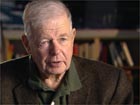 |
Werner Angress
Werner Angress, who emigrated as a 19-year-old to the US, was assigned as an interrogator to an airbourne division after his training in Camp Ritchie - despite having never jumped before. Today the former Professor for History lives again in his native town Berlin.
© TANGRAM |
 angress.jpg (280 KB) angress.jpg (280 KB) |
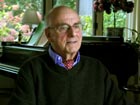 |
Victor Brombert
Victor Brombert, Professor for French Language and Literature in Princeton, left Europe in 1941. In Camp Ritchie he was trained as an interrogator in French and German.
© TANGRAM (Harald Stuckmann) |
 brombert.jpg (420 KB) brombert.jpg (420 KB) |
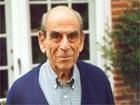 |
Philip Glaessner
The economist Philip Glaessner grew up in Vienna. Trained in Camp Ritchie he served as a IPW - interrogator of prisoners of war - in WW II.
© TANGRAM (Harald Stuckmann) |
 glaessner.jpg (520 KB) glaessner.jpg (520 KB) |
 |
Fred Howard
The New York based designer and businessman Fred Howard emigrated to the US in 1937. After training in Camp Ritchie he returned to Europe as a specialist for psychological warfare.
© TANGRAM (Harald Stuckmann) |
 howard.jpg (288 KB) howard.jpg (288 KB) |
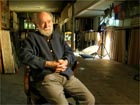 |
Si Lewen
The artist Si Lewen, one of the "Ritchie Boys", in his studio North of New York. At the age of fourteen he fled Germany for the US, and returned to Europe in 1944 as a specialist for psychological warfare.
© TANGRAM (Harald Stuckmann) |
 lewen.jpg (484 KB) lewen.jpg (484 KB) |
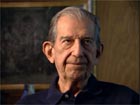 |
Rudolf Michaels
Rudolf Michaels, lawyer and judge in Sacramento, fled Germany shortly after the Kristallnacht. Trained in Camp Ritchie he served as a IPW - interrogator of prisoners of war - in WW II.
© TANGRAM |
 michaels.jpg (280 KB) michaels.jpg (280 KB) |
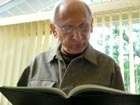 |
Morris Parloff
Morris Parloff is one of the few Americans amongst the "Ritchie Boys". The psychologist, who became a leading research figure in the National Institute for Mental Health, was assigned to a special unit in WW II.
© TANGRAM (Harald Stuckmann) |
 parloff.jpg (352 KB) parloff.jpg (352 KB) |
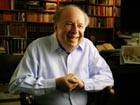 |
Richard Schifter
Former U.N. Ambassador Richard Schifter emigrated from Vienna to the US. In Camp Ritchie he was trained in psychological warfare and returned to Europe as an American soldier in 1944.
© TANGRAM (Harald Stuckmann) |
 schifter.jpg (356 KB) schifter.jpg (356 KB) |
 |
Hans Spear
In 1938 "Ritchie Boy" Hans Spear fled Germany - the country where his family had lived for over 500 years. After training in Camp Ritchie he returned to Europe in 1944 as a specialist for psychological warfare.
© TANGRAM (Harald Stuckmann) |
 spear.jpg (448 KB) spear.jpg (448 KB) |
 |
Guy Stern
Guy Stern, Distinguished Professor for German at the Wayne State University in Detroit, served as an interrogator of prisoners of war during WW II and received the Bronze Star for his merits.
© TANGRAM (Harald Stuckmann) |
 stern.jpg (456 KB) stern.jpg (456 KB) |



